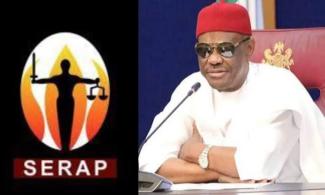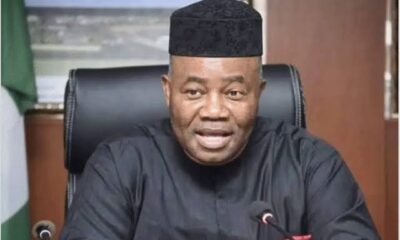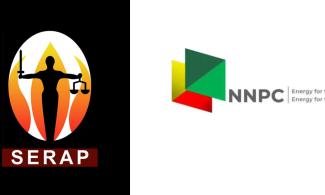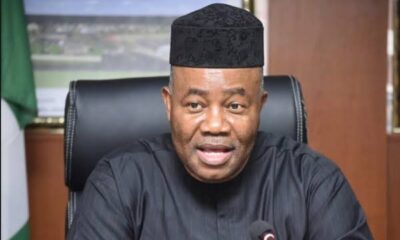Top Story
10th NASS: SERAP gives Akpabio, Abass seven days to drop plan to spend N110bn on bulletproof cars, others
Socio-Economic Rights and Accountability Project (SERAP) has urged the Senate President, Mr Godswill Akpabio and Speaker of House of Representatives, Mr Tajudeen Abbas “to drop the scandalous plan to spend N40bn on 465 exotic and bulletproof cars for members and principal officials, and N70bn as ‘palliatives’ for new members.”
SERAP urged them to “repeal the 2022 Supplementary Appropriation Act to reduce the budget for the National Assembly by N110bn, reflect the current economic realities in the country and address the impact of the removal of fuel subsidy on the over 137 million poor Nigerians.”
SERAP also urged them to “request President Bola Tinubu to present a fresh supplementary appropriation bill, to redirect the N110 billion to address the situation of the over 20 million out-of-school children in Nigeria, for the approval of the National Assembly.”
According to reports, “While N70 billion ‘support allowance’ is budgeted for 306 new lawmakers, only N500 billion worth of palliatives is budgeted for 12 million poor Nigerians. N40 billion is also allocated to buy 465 Sports Utility Vehicles (SUVs) and bulletproof cars for members and principal officials.”
In the letter dated 15 July, 2023 and signed by SERAP deputy director Kolawole Oluwadare, the organisation said: ”This travesty, and apparent conflicts of interest and self-dealing by members of the National Assembly must stop.”
SERAP said, “It a fundamental breach of their fiduciary duties for members of the National Assembly to arbitrarily increase their own budget and to use the budget as a tool to satisfy the lifestyle of lawmakers.”
The letter, read in part: “It is a grave violation of the public trust and constitutional oath of office for members of the National Assembly to unjustifiably increase their own budget at a time when over 137 million poor Nigerians are living in extreme poverty exacerbated by the removal of fuel subsidy.
“We would be grateful if the recommended measures are taken within seven days of the receipt and/or publication of this letter. If we have not heard from you by then, SERAP shall take all appropriate legal actions to compel you and the National Assembly to comply with our request in the public interest.
“Rather than exercising their constitutional and oversight functions to pursue the public interest by considering bills to improve the conditions of the over 137 million poor Nigerians who are facing the impact of the removal of fuel subsidy, the lawmakers seem to be looking after themselves.
“According to reports, no fewer than 107 units of the 2023 model of the Toyota Landcruiser and 358 units of the 2023 model of Toyota Prado would be bought for the use of members of the Senate and the House of Representatives respectively.
“The planned purchase is different from the official bulletproof vehicles expected to be purchased for the four presiding officers of the National Assembly.
“The proposed spending of N110 billion by members of the National Assembly is apparently on top of the N281 billion already provided for the lawmakers in the 2023 National Assembly budget. The proposed spending is also different from the N30.17 billion budgeted for the ‘inauguration expenses’ for new members.
“SERAP is concerned that the budget for the National Assembly may further be increased as members are reportedly demanding an upward review of their salaries and allowances purportedly to offset the impact of the removal of fuel subsidy.
“Section 14(2)(b) of the Nigerian Constitution of 1999 [as amended] provides that, ‘the security and welfare of the people shall be the primary purpose of government.
“Under Section 16(1)(a)(b), the National Assembly has the obligations to ‘harness the resources of the nation and promote national prosperity and an efficient, a dynamic and self-reliant economy’, and to ‘secure the maximum welfare, freedom and happiness of every citizen.’”
“Section 18 of the Constitution of Nigeria provides among others that: ‘Government shall direct its policy towards ensuring that there are equal and adequate educational opportunities at all levels. Government shall strive to eradicate illiteracy; and to this end Government shall provide (a) free, compulsory and universal primary education.
“The Compulsory, Free Universal Basic Education Act also provides in Section 2(1) that, ‘Every Government in Nigeria shall provide free, compulsory and Universal basic education for every child of primary and junior secondary, school age.’
“The proposed spending of N110 billion by members of the National Assembly is a fundamental breach of the Nigerian Constitution and the country’s international human rights obligations.
“Nigerians have a right to honest and faithful performance by their public officials including lawmakers, as public officials owe a fiduciary duty to the general citizenry.
“Cutting the N110 billion from the budget of the National Assembly would be entirely consistent with your constitutional oath of office, and the letter and spirit of the Nigerian Constitution, as it would promote efficient, honest, and legal spending of public money.
“The problem of out-of-school children has continued to have catastrophic effects on the lives of millions of children, their families and communities.
“By being out of school, these Nigerian children have been exposed to real danger, violence and even untimely death. Redirecting the proposed spending of N110 billion to address the situation of over 20 million out-of-school children across the country would improve access of Nigerian children to quality education.
“Education is both a human right in itself and an indispensable means of realizing other human rights. As an empowerment right, education is the primary vehicle by which economically and socially marginalized adults and children can lift themselves out of poverty and obtain the means to participate fully in their communities.
“Under international law, states are required to progressively implement socio-economic rights including the right to quality education commensurate with the level of resources available. Gross misallocation of resources to the detriment of the enjoyment of the right to quality education can constitute a human rights violation.”
Top Story
Lagos-Calabar Highway: Atiku faults FG’s demolition of properties


..Accuses Tinubu of prioritising business over public good
…Says demolition of Landmark, others unfriendly to foreign Investors
…Says N1trn released without approval, accuses FG of financial recklessness
By Sodiq Adelakun
Former Vice President and Peoples Democratic Party (PDP) presidential candidate, Atiku Abubakar, has strongly condemned the demolition of properties in the Oniru corridor, including parts of Lagos State’s landmark, tourist, and recreational attractions, to make way for the Coastal Highway project.
Recall that Labour Party (LP) presidential candidate in the 2023 general election, Peter Obi, faulted the ongoing Lagos-Calabar Coastal Highway project, describing it as not necessary.
Obi had earlier condemned the commencement of the multi-trillion naira coastal highway project, when most internal roads in the country were impassable.
Meanwhile, Atiku criticised the lack of proper notification and the Tinubu-led government’s handling of the project, which he believes is a major hindrance to Nigeria’s ability to attract foreign direct investment.
In a statement issued on Sunday by his media adviser, Paul Ibe, Atiku alleged that President Bola Tinubu and Gilbert Chagoury, the owner of Hitech, the contractor handling the highway project, are the sole driving forces behind the rapid progress of the Coastal Highway project.
He claimed that the contract was awarded in violation of procurement regulations, raising concerns about transparency and accountability.
Furthermore, Atiku highlighted a clear conflict of interest, pointing out that President Tinubu’s son and associates hold positions on the boards of companies owned by Gilbert Chagoury.
The former Vice President noted that “Tinubu’s son, Seyi, is a director on the board of CDK Integrated Industries, a subsidiary of the Chagoury Group, which manufactures ceramic tiles and sanitary towels.
Part of the statement reads, “The former Vice President restated that it has become obvious even to the undiscerning that the Lagos-Calabar Coastal Highway is being done in a hurry purely because of the business relationship between Tinubu and Gilbert Chagoury, the owner of Hitech, the contractor that was awarded the contract for the highway project in contravention of the procurement laws. It is on record that this project is the most expensive single project ever embarked upon by the Nigerian government.
“The fact that it is happening at a time when Nigeria is facing its worst economic crisis ever is a red flag.
“To add insult to injury, this project that is being done for more than $13bn was awarded without competitive bidding. From all indications, the so-called Badagry-Sokoto highway would be awarded similarly at an enormous cost to taxpayers purely because Tinubu has put his interest ahead of the Nigerian people.”
Atiku said the demolition of tourist and recreational facilities and other properties within the Oniru corridor, including parts of Landmark, without ample notice, is one of the reasons foreign direct investments continue to elude the country.
He reiterated that “rather than improving the ease of doing business, the Tinubu administration had shown to the world that his personal business interest and that of his family would always be prioritised over and above national interest.”
Atiku noted that investors observe the treatment of local businesses and would avoid regions where their investments lack protection.
The former PDP presidential candidate stressed, “Tinubu has been globetrotting in search of foreign direct investments. He claims to have secured over $30 billion from various companies, but none has been forthcoming. Rather, all manufacturing firms have been posting heavy losses while some are exiting due to his poorly implemented exchange rate unification policy with even Aliko Dangote describing it as a huge mess at the recent annual general meeting of Dangote Sugar Refinery.
“The IMF in its latest report stated that Nigeria will by the end of the year become the 4th largest economy in Africa behind South Africa, Egypt and Algeria, a disgraceful development for a nation which was the largest in Africa by a mile when the PDP left the stage in 2015.
“Investors are seeing how local businesses are being treated and will not come to a place where their investments will not be protected. In saner climes, businesses such as Landmark would have been given at least two years’ notice for effective planning. But Tinubu’s eagerness to satisfy his business partners impaired his ability to coordinate the project properly.”
In the same vein, he criticised the Tinubu administration’s handling of the Lagos-Calabar coastal highway project, calling it a “rushed” and “reckless” endeavor.
Atiku noted that the environmental impact assessment report was not completed, and the right of way for the 700 km stretch of the project was not secured.
He also pointed out that the project was converted from a public-private partnership (PPP) to a government-funded project without proper approval, and that over N1 trillion was released without National Assembly approval, ignoring the initial N500 million approved by the legislature.
Top Story
Corruption allegations: EFCC denies issuing list of ex-Govs under investigation


By Adeyanju Esther
In response to a recent flurry of reports circulating in various media outlets, the Economic and Financial Crimes Commission (EFCC) has come forward to disassociate itself from a purported list of ex-governors allegedly under investigation for corruption.
The commission has denied “any involvement in the dissemination of such information and asserts that no discussions regarding the investigation of ex-governors have taken place with any media entity.”
The report, titled ‘EFCC Releases Full List of 58 Ex-Governors that Embezzled N2.187 Trillion,’ has been deemed by the EFCC as false and misleading.
The Commission has clarified that it neither issued nor endorsed the aforementioned list, emphasising that it is a fabrication with motives known only to its authors.
“The EFCC urges the public to disregard the false report and warns the media against perpetuating inaccurate information that could mislead the public.
“Furthermore, the EFCC advises media organizations to exercise diligence in fact-checking and verifying information related to ongoing investigations by consulting directly with the commission to prevent the spread of false and misleading reports,” the Commission said.
Top Story
N5.9trn, $4.6bn loans: SERAP sues Sani, Wike


The Socio-Economic Rights and Accountability Project (SERAP) has filed a lawsuit against Nigeria’s governors and the Minister of the Federal Capital Territory, Abuja, Mr Nyesom Wike “over their failure to account for N5.9 trillion and $4.6 billion loans obtained by their states and the FCT, and to publish copies of the loan agreements, including details and locations of projects executed with the loans.”
The suit followed the disclosure last month by Governor Uba Sani of Kaduna State that the immediate past administration of Nasir El-Rufai left $587m, N85bn debt and 115 contractual liabilities, making it impossible for the state to pay salaries.
In the suit number FHC/ABJ/CS/592/2024 filed last Friday at the Federal High Court, Abuja, SERAP is asking the court to “direct and compel the governors and Mr Wike to account for N5.9trn and $4.6bn loans obtained by their states and the FCT and to publish copies of the loan agreements, location of projects executed with the loans.”
SERAP is also asking the court to “direct and compel the governors and Mr Wike to invite the Economic and Financial Crimes Commission [EFCC] and the Independent Corrupt Practices and Other Related Offences Commission [ICPC] to investigate the spending of all the loans obtained to date by their states and the FCT.”
In the suit, SERAP is arguing that, “It is in the public interest to grant the reliefs sought. Nigerians have the right to see and scrutinise the loan agreements and know the details of how the domestic and external loans obtained by the governors and FCT minister are spent.”
According to SERAP, “Opacity in the spending of the loans obtained by the governors and Mr Wike would continue to have negative impacts on the fundamental interests of the citizens.”
SERAP is also arguing that, “Many states and the FCT are reportedly spending public funds which may include the loans obtained by them to fund unnecessary travels, buy exotic and bulletproof cars and generally fund the lavish lifestyles of politicians.”
SERAP is also arguing that, “Many states and the FCT are also allegedly mismanaging public funds which may include domestic and external loans obtained from bilateral and multilateral institutions and agencies.”
According to SERAP, “Many states and the FCT reportedly owe civil servants’ salaries and pensions. Several states are borrowing to pay salaries. Millions of Nigerians resident in the state and FCT continue to be denied access to basic public goods and services such as quality education and healthcare.”
According to SERAP, “Transparency in the spending of the loans obtained by the states and FCT is fundamental to increase accountability, prevent corruption, and build trust in democratic institutions with the ultimate aim of strengthening the rule of law.”
The suit filed on behalf of SERAP by its lawyers Kolawole Oluwadare, Kehinde Oyewumi and Ms Valentina Adegoke, read in part: “States and the FCT should be guided by transparency and accountability principles and proactively account for the loans obtained and publish copies of the loan agreements.
“Widely publishing copies of the loan agreements and spending details of the loans obtained would ensure that persons with public responsibilities are answerable to the people for the performance of their duties in the management of public funds.
“State governors and Mr Wike cannot hide under the excuse that the Freedom of Information Act is not applicable to their states and the FCT. The legal obligations to publish the information sought are also imposed by the provisions of the Nigerian Constitution and the African Charter on Human and Peoples’ Rights.
“According to Nigeria’s Debt Management Office, the total public domestic debt portfolio for the country’s 36 states and the Federal Capital Territory is N5.9 trillion. The total public external debt portfolio is $4.6 billion.
“The domestic and external loans obtained by the states and the FCT are vulnerable to corruption and mismanagement. The states and FCT have a responsibility to ensure transparency and accountability in how any loans obtained by the states and FCT are spent, to reduce vulnerability to corruption and mismanagement.
“Directing and compelling the states and FCT to publish copies of the loan agreements would allow Nigerians to scrutinise them, and promote transparency and accountability on the spending of public funds including the loans obtained.
“Providing and widely publishing the details of the spending of the domestic and external loans obtained by the states and FCT would enable Nigerians to effectively and meaningfully engage in the management of the loans.
“The constitutional principle of democracy also provides a foundation for Nigerians’ right to know the details of loan agreements and how the loans obtained are spent. Citizens’ right to know promotes openness, transparency, and accountability that is in turn crucial for the country’s democratic order.
“The effective operation of representative democracy depends on the people being able to scrutinize, discuss and contribute to government decision making, including on the spending of loans obtained by the states and FCT.
“To do this, they need information to enable them to participate more effectively in the management of public funds by their state governments and the FCT.
“The public interest in obtaining information about expenditures relating to the loans obtained by the states and FCT outweighs any privacy or other interest.
“The oversight afforded by public access to such details would serve as an important check on the activities of the states and FCT and help to prevent abuses of the public trust.
“There is a significant risk of mismanagement or diversion of funds linked to loans obtained by state governments and the FCT. The accounts of Nigeria’s 36 states and the FCT are generally not open to public scrutiny.
“The Nigerian Constitution, human rights and anti corruption treaties to which Nigeria is a state party also impose obligations on the states and FCT to prevent mismanagement or diversion of public funds including the loans obtained.
“Many years of allegations of corruption and mismanagement of public funds including the loans obtained by the states and FCT have contributed to widespread poverty, underdevelopment and lack of access to public goods and services.”
No date has been fixed for the hearing of the suit.
-
capital market2 years ago
Rt.briscoe, FBNH, Others halts negative performance of stock market
-
Finance3 months ago
Court orders Sen. Victor Umeh to repay N136m bank debt to AMCON
-



 Abuja Update2 months ago
Abuja Update2 months agoUNDP, FG partnership needed to achieve inclusion, equity- Minister
-
Abuja Update1 month ago
Banks drive stock market performance with N147bn gain
-



 Business2 weeks ago
Business2 weeks agoTingo Group unveils Tingo Electric, Tingo Cola drink at Lagos launch
-



 Health3 weeks ago
Health3 weeks agoCapacity training will reduce migration of health workers- NPHCDA
-
News4 months ago
Oil thieves sponsoring malicious media campaign against Navy – Spokesman
-



 Infotech1 month ago
Infotech1 month agoWorld Backup Day: NITDA urges Nigerians to ensure backup of data














free porn
July 17, 2023 at 2:12 pm
Excellent post. I was checking consztantly this blog and I’m inspired!
Very usefuyl informmation pawrticularly the rermaining phase 🙂 I handle such info a lot.
I was seeking this partricular info for a long time.
Thans and good luck.